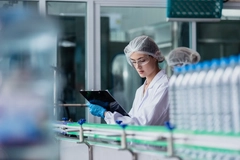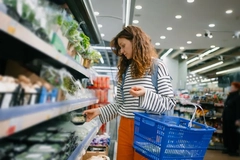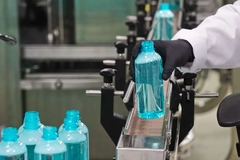Ineos and Lactel partner on “world’s first” HDPE milk bottles from advanced recycling

24 May 2021 --- Ineos Olefins and Polymers (O&P) Europe is partnering with dairy brand Lactel to produce the “world’s first” HDPE bottles from advanced recycling.
In a trial production of 140,000 milk bottles, the partnership is exploring a solution for UHT milk bottles, which are produced with circular polyethylene (PE), derived from post-consumer recycled (PCR) material.
Speaking to PackagingInsights, Marco Amici, a senior business development manager at Ineos, says the project tackles a difficult aspect of recycling.
“HDPE for milk bottles demands a very high level of product consistency and compliance, with the most stringent food regulations.”
“These challenges were overcome by tight collaboration between Lactel and Ineos, answering these needs via attributed recycled PE from advanced recycling.”
Material savings
Amici explains the project, which is still in its early stages, will help circularize material usage in the production chain and could result in significant energy and waste reductions.
“This project allows the recycling of post-consumer mixed plastic waste as raw material for the generation of attributed recycled PE, which has exactly the same performance and properties as the fossil-based counterpart.” Rabobank is predicting advanced recycling to double to around 140 plants globally by 2025 as regulatory and public demand for recycled plastics packaging drives big investment.
Rabobank is predicting advanced recycling to double to around 140 plants globally by 2025 as regulatory and public demand for recycled plastics packaging drives big investment.
“Material savings through the project are measured in the replacement of feedstock from fossil oil by that of waste plastics, which helps to reduce reliance on fossil resources.”
“In addition, recycling mixed plastic waste diverts it from incineration, thereby avoiding the associated emissions.”
Circular economy transition
Lactel’s production plant has been Roundtable Sustainable Biomaterials (RSB) certified, ensuring high sustainability criteria through the value chain.
Advanced recycling technology converts waste plastic back to its basic molecules, which are then used in Ineos’ production sites to incorporate recycled contents and replace traditional fossil-based raw materials.
Ineos is partnering with Plastic Energy, a UK-based technology company, for pyrolysis of mixed plastics waste.
The process, says Amici, is efficient both in the nature of the feed and the energy usage, which was a key prerequisite for Ineos.
Amici says the project is a step toward using such advanced recycling technologies for other types of packaging.
“Advanced Recycling is needed to enable a full transition to a circular economy of the overall packaging industry.”
“Yet, it could not be possible without recognizing mass balance and the rigorous certification from external bodies such as RSB.”
“We see this as a key technology to meet the needs of recycled polyolefin content across the whole range of food contact packaging.”
The PCR is sourced from waste in the EU.
Advanced recycling proliferates
Rabobank is predicting advanced recycling plants to double to around 140 plants globally by 2025 as regulatory and public demand for recycled plastics packaging drives “huge” investment.
PackagingInsights recently explored the rise of advanced recycling technologies with Susan Hansen, global strategist for F&A supply chains at Rabobank.
Hansen shared insights on global investments, including COVID-19 impacts, and discussed why advanced recycling is not a silver bullet for the plastics circular economy.
By Louis Gore-Langton











